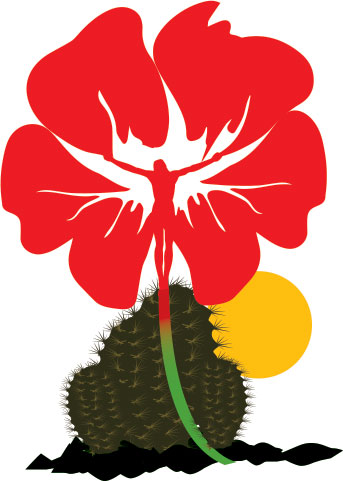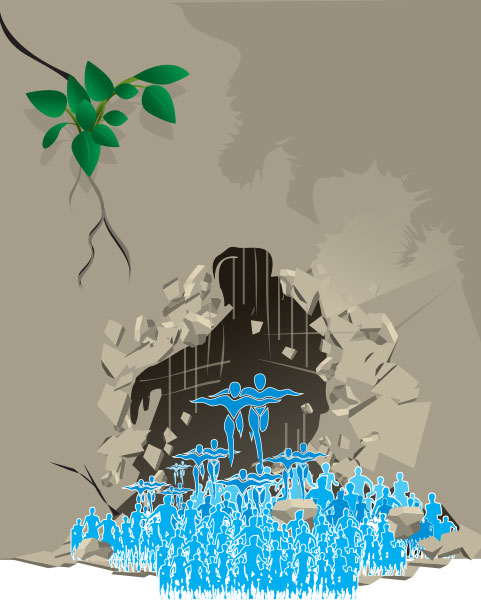Archive
যে আমি ওই ভেসে চলে
যে আমি ওই ভেসে চলেকালের ঢেউয়ে আকাশতলে
ওরই পানে দেখছি আমি চেয়ে ।
ধুলার সাথে , জলের সাথে
ফুলের সাথে , ফলের সাথে ,
সবার সাথে চলছে ও যে ধেয়ে ।।
ও যে সদাই বাইরে আছে ,
দুঃখে সুখে নিত্য নাচে ---
ঢেউ দিয়ে যায় , দোলে যে ঢেউ খেয়ে ।
একটু ক্ষয়ে ক্ষতি লাগে ,
একটু ঘায়ে ক্ষত জাগে ---
ওরই পানে দেখছি আমি চেয়ে ।।
যে আমি যায় কেঁদে হেসে
তাল দিতেছে মৃদঙ্গে সে ,
অন্য আমি উঠতেছি গান গেয়ে ।
ও যে সচল ছবির মতো ,
আমি নীরব কবির মতো ----
ওরই পানে দেখছি আমি চেয়ে ।
এই -যে আমি ঐ আমি নই ,
আপন মাঝে আপনি যে রই ,
যাই নে ভেসে মরণধারা বেয়ে ---
মুক্ত আমি তৃপ্ত আমি ,
শান্ত আমি দীপ্ত আমি ,
ওরই পানে দেখছি আমি চেয়ে ।।
Je Ami Oi Bhese Chole
Parjaay: Bichitro (30)Taal: Dadra
Style: Baul Sur
Anga: Baul
Written on: 1918
Swarabitan: 34 (Geetabithika)
Notation by: Dinendranath Tagore
Neutral perception of self provides more objective information. Objectivity controls subjective biasness.
Everything in this universe is dynamic. Nothing is quiescent or static. The poet views his self as flowing with time. With the passage of time nature undergoes its transitional course through maturing with experience Tagore has divided himself into two entities: one that participates in worldly activities and gathers experiences; the other standing still as witness and merely observing without being perturbed. This observation of the mind has been described as Vedantic meditation of which Swami Vivekananda has discussed in his Rajyoga Swami Aurobinda has elucidated in Basis of Yoga. Gautama Buddha has stressed the need to separate the mind from the ego in his Vipassana Meditation. He too taught his disciples to dissociate their one part of the mind or rather their selves and observe as “sakshi” or witness and feel the flow of time and nature. Much of our suffering stems from egoistic attachment to the world. We tend to forget that we are not the body, not mind, not the sense “ Manōbuddhyahankārchittāni nāhang, na shrõtrang na jihwā na cha ghrānnetrām”- Ādi Shankacharya’s Nirvāñāśtram. This dissociation of self, extremely difficult to practise, is the viewpoint of Tagore in the song.
যে আমি ওই ভেসে চলে
Songs Related Images:
Songs Related Videos:
বিপদে মোরে রক্ষা করো
বিপদে মোরে রক্ষা করো এ নহে মোর প্রার্থনা–বিপদে আমি না যেন করি ভয়।
দুঃখতাপে ব্যথিত চিতে নাই-বা দিলে সান্ত্বনা,
দুঃখে যেন করিতে পারি জয়॥
সহায় মোর না যদি জুটে
নিজের বল না যেন টুটে,
সংসারেতে ঘটিলে ক্ষতি,
লভিলে শুধু বঞ্চনা
নিজের মনে না যেন মানি ক্ষয়।
আমারে তুমি করিবে ত্রাণ
এ নহে মোর প্রার্থনা–
তরিতে পারি শকতি যেন রয়।
আমার ভার লাঘব করি
নাই-বা দিলে সান্ত্বনা,
বহিতে পারি এমনি যেন হয়।
নম্রশিরে সুখের দিনে
তোমারি মুখ লইব চিনে–
দুখের রাতে নিখিল ধরা
যেদিন করে বঞ্চনা
তোমারে যেন না করি সংশয়।
Bipode More Rokkha Koro
Parjaay: PujaUpa-parjaay: Dukkha
Taal: Jhampak
Raag: Iman-Kalyan
Written on: 1906 (1313)
Collection: Geetanjali
Here is a hymn that defines an adamantine devotee who does not seek protection from danger, consolation in grief, help in distress and deprivation, rescue from trouble or relief from burden. He prays to the Almighty to be vouchsafed courage to face danger, fortitude to bear grief, strength to combat distress and deprivation, zest and vim to cross hurdles, and energy to shoulder his own burden. Above all, he prays for firm, resolute and unwavering faith in the Divine amidst consternation. To him God is not a messiah to deliver from trouble but a fountain head of energy and strength as well as a perennial source of inspiration.
বিপদে মোরে রক্ষা করো
Songs Related Images:
Songs Related Videos:
বৈরাগ্যসাধনে মুক্তি সে আমার নয়...
বৈরাগ্যসাধনে মুক্তি , সে আমার নয় ।অসংখ্য বন্ধন-মাঝে মহানন্দময়
লভিব মুক্তির স্বাদ । এই বসুধার
মৃত্তিকার পাত্রখানি ভরি বারম্বার
তোমার অমৃত ঢালি দিবে অবিরত
নানাবর্ণগন্ধময়। প্রদীপের মতো
সমস্ত সংসার মোর লক্ষ বর্তিকায়
জ্বালায়ে তুলিবে আলো তোমারি শিখায়
তোমারি মন্দির-মাঝে ।
ইন্দ্রিয়ের দ্বার
করি যোগাসন , সে নহে আমার।
যে- কিছু আনন্দ আছে দৃশ্যে গন্ধে গানে
তোমার আনন্দ রবে তার মাঝখানে।
মোহ মোর মুক্তিরূপে উঠিবে জ্বলিয়া,
প্রেম মোর ভক্তিরূপে রহিবে ফলিয়া ।
Bairagya Sadhane Mukti Se Amar Noy
AnalysisEmancipation is never welcomed through sainthood. Domestic shackles and responsibilities are there to enjoy the taste of freedom . The earth rejuvenates herself with the heavenly nectar, decorates herself with the heavenly flame reflected through the inner radiance of the omnipotent.
This ever- smiling face of the Earth cordially invites us in such a way to cherish the beauty of her own that the poet discards the thought to seclude himself from enjoying the world with carnal desires. Rather, he affirms that lust and love will be transformed into purity and piety -- the presence of the Almighty
মুক্তি
Songs Related Images:
Songs Related Videos:
বাঁধ ভেঙে দাও
ভাঙো, বাঁধ ভেঙে দাও , বাঁধ ভেঙে দাও , বাঁধ ভেঙে দাও ।বন্দী প্রাণ মন হোক উধাও ।।
শুকনো গাঙে আসুক
জীবনের বন্যার উদ্দাম কৌতুক .....
ভাঙনের জয়গান গাও ।
জীর্ণ পুরাতন যাক ভেসে যাক্ ,
যাক্ ভেসে যাক্ , যাক্ ভেসে যাক্।
আমরা শুনেছি ঐ মাভৈঃ মাভৈঃ মাভৈঃ
কোন্ নূতনেরই ডাক ।
ভয় করি না অজানারে ,
রুদ্ধ তাহারি দ্বারে দূর্দাড় বেগে ধাও ।।
Baandh Bhenge Dao
Analysis
This song asserts the need to do away with old, stale and hackneyed customs, conventions, beliefs and rituals which hold us from progress. It exhorts us to prepare ourselves to accept the new that is necessary to usher in growth and development. It beckons us to restructure our mind that holds us back and discourages us to try anything novel. Change is the only permanent phenomenon. Yet we are afraid to welcome the new order. We do not easily embrace the new even if the old system has lost its relevance. Our stick-in -the mud attitude is often responsible for our stagnation both physical and mental. This song instils the courage necessary to break asunder our ties with things that retard our progress. We need to rejig our thoughts and muster self-confidence as well as grit .





